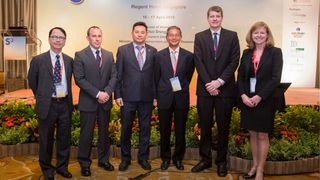Sandy Burgoyne, Director of the Future Cities Collaborative, was invited to share with academics and practioners the innovative work of the Future Cites Program at the S3 Singapore Sustainability Symposium held in Nanyang Technological University in April, and the ISCN 2015 Conference held at Hong Kong University in June. She shares with us her thoughts about the conferences and why Universities and Cities must work collaboratively to acheive sustainble development.
One of the major challenges of the 21st Century is managing the smart growth of our cities, so too, is empowering our city leaders with the best insights and science to help them to lead the development of our communities, so that they are productive, sustainable and liveable. This theme was underlined at both S3 Singapore Sustainability Symposium and the International Sustainable Campus Network 2015 Conference earlier this year. With a commitment to sustainability and urban solutions that are transdisciplinary, transboundary and integrated, Singapore’s Nanyang Technological University recently hosted the second S3 Singapore Sustainability Symposium. Government leaders, academics, and specialists from around the world attended the symposium.
The key themes outlined below informed the discussion at the World Cities Summit Mayor’s Forum in June this year.
- Cities will play an increasingly important role in addressing adaptation challenges, because they will feel many of the impacts most severely and because they're often in the best position to implement high-impact solutions.
- It's important to avoid the cynicism often associated with discussions about environmental impact challenges, such as climate change. Cities are often refreshingly insulated from this negativity, and should strive to keep this positive frame to focus on opportunities and more inclusive development.
- Cities need champions and leaders to drive sustainability agendas and solutions forward. These champions should move beyond the foundation of immediate cost and logistics planning to describe a vision of what future and liveable cities could become.
- Research, science, and R&D will continue to provide concrete and relevant information to support decision-making and action in cities.
The discussion and key themes underlined the need for innovative and collaborative approaches to ensure that city leaders, who are making investment decisions about how our cities are developed, receive the most relevant and current thinking to inform their envisioning process and help solve many of the environmental and urban challenges that communities face. It was also recognised that there can be a delay in the transference of knowledge and research findings between the city leaders and research institutions, leading to sub-optimal solutions for sustainable urban development.
This theme was amplified at the International Sustainable Campus Network (ISCN) conference, which recently held it’s 9th annual conference at The University of Hong Kong. The theme of the conference was “Expanding the Dialogue: Sustainability in a Connected World”.
The session that the Future Cities Collaborative was invited to contribute to was focused on the way in which universities and cities can form effective, collaborative alliances to contribute towards meeting the challenge of urban living in the 21st Century.
Mayor Park Won Soon from Seoul, a renowned advocate of sustainable development, kicked off the session confirming that to make greater ground in developing sustainable cities we need "participatory platforms for academics, and students to provide advice and ideas.. to our city leaders." He explicitly made the point that cities and universities must work together to achieve their collective goals both in terms of infrastructure and the development of its communities. Seoul has worked with many universities in South Korea to further these aims.
John Robinson, University of British Columbia, went further to suggest that Universities are best placed to serve as a “Living Laboratory” for demonstrating precinct scale sustainability solutions, which then can be replicated across similar environments in other cities.
As described by Andy Nolan, Director of Sustainability, University of Nottingham, the world’s number one ranking Green University in the UI Green Index, commented, “ …Urbanisation is the perfect platform to encourage inter-disciplinary collaboration within universities. Those UK universities who have identified this as an opportunity to promote this through an emphasis on urbanisation are creating think tanks, centres of excellence and institutes to address them.”
The Future Cities Collaborative, focused on inspiring city leaders by bringing together innovative approaches to policy, practice and research, is forging new ways for universities to work with city leaders to create sustainable communities. Universities and think tanks such as these are well placed to provide a neutral environment for informed debate and learning amongst diverse city leaders, leading to greater confidence and capacity for participating leaders to make brave decisions on new approaches and technologies to create sustainable cites. Increased cross-sectoral collaboration is required to affect meaningful change in creating thriving towns and cities.
So, a key take out is that we need to continue to close the knowledge gap between the decision makers of our cities and the world’s urban scientists and researchers, if we are going to bring the best solutions to solve our urban challenges. Real–time collaboration across academia, government, community and industry will continue to inspire and inform what is possible locally, and at scale across the globe.





